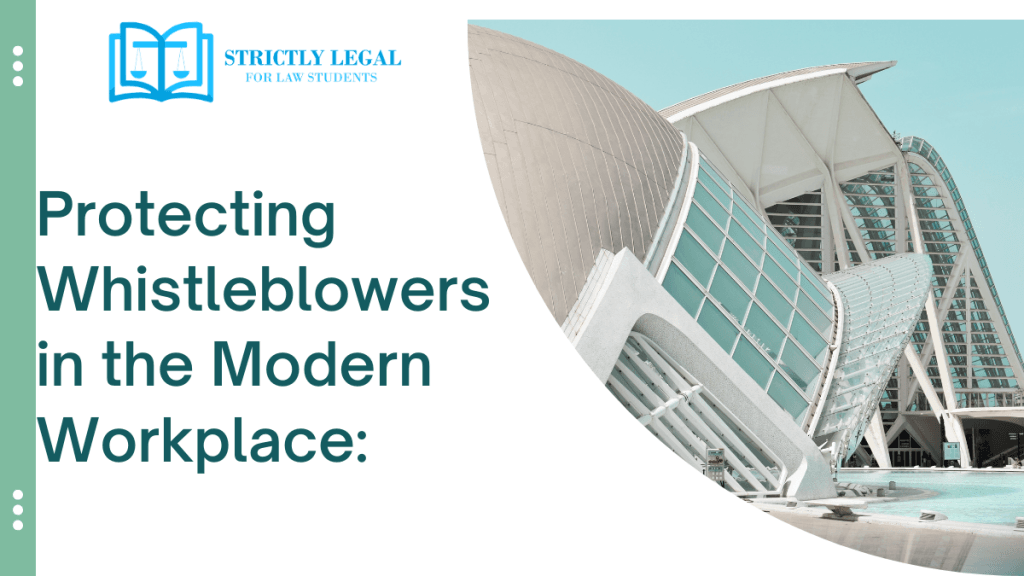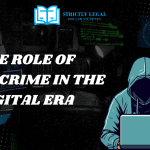In today’s fast-paced, highly competitive corporate environment, whistleblowers are essential in identifying unethical practices, corporate wrongdoing, and illegal activities that might otherwise go unnoticed. However, the courage to speak out can come with personal and professional risks, ranging from retaliation to dismissal. As a result, legal protections for whistleblowers are crucial to ensuring that employees feel safe to report misconduct without fear of punishment. This article explores the legal frameworks surrounding whistleblower protection, the challenges faced by those who come forward, and the evolving role of workplace culture in fostering accountability.
Table of Contents
The Importance of Whistleblowers in the Workplace
Whistleblowers play a key role in maintaining transparency, ethical business practices, and corporate accountability. Their disclosures often reveal vital information about activities like fraud, corruption, safety violations, environmental damage, or discrimination. Without whistleblowers, companies and government organizations may conceal misconduct, leading to potential harm to employees, consumers, or the public at large. While their disclosures can be transformative, whistleblowers often face intense pressure and retaliation. This is why laws designed to protect them have become essential in modern workplaces. These protections are designed to provide legal recourse to whistleblowers if they face negative consequences for their actions, such as wrongful termination, demotion, harassment, or job reassignment.
Legal Protections for Whistleblowers
Legal protections for whistleblowers vary depending on jurisdiction and the type of misconduct being reported. Globally, different laws address the rights of whistleblowers in specific industries, with some countries offering more robust safeguards than others. The following are key legal frameworks and protections in some regions:
United States:
In the U.S., whistleblower protection is governed by a combination of federal and state laws. Some of the most significant include:
The Whistleblower Protection Act (WPA) – This federal law applies to federal employees who report violations of laws or regulations in the workplace. It prohibits retaliation against employees who disclose misconduct.
The Sarbanes-Oxley Act (SOX) – Designed to protect employees of publicly traded companies, SOX covers whistleblowers who report securities fraud, financial misstatements, or violations of accounting regulations.
The Dodd-Frank Wall Street Reform and Consumer Protection Act – This law provides additional protections and financial incentives for whistleblowers who report violations related to securities law, fraud, and financial crimes, offering rewards for successful claims.
State Laws – Many U.S. states have their own whistleblower protection laws that cover a broader range of employees, including those working in the private sector.
European Union
The EU has made strides in safeguarding whistleblowers through the EU Whistleblower Protection Directive, which was adopted in 2019. The directive requires all EU member states to establish robust systems for reporting misconduct and protect whistleblowers from retaliation, including legal and financial consequences. It applies to a wide range of sectors, including public sector employees, private companies, and NGOs.
United Kingdom
In the UK, whistleblower protection is governed by the Public Interest Disclosure Act (PIDA), which was introduced in 1998. It provides protection for employees who report wrongdoing in good faith, covering a range of issues such as criminal activity, health and safety violations, and environmental harm. It also ensures that employees cannot be dismissed or treated unfairly for making disclosures.
Corporate Whistle Blowing in India
Journalist Sucheta Dalal exposed one of the largest stock market scams, the Harshad Mehta Scam, in 1992. In an article published in the Times of India, she detailed Mehta’s strategy. Another name for him was the “Big Bull.” He took advantage of the weaknesses in the stock market and banking institutions. He was breaking into the banking system to finance his purchase, inflating the share values of some companies by utilizing fictitious bank receipts to manipulate stock prices. Using this borrowed money, he began purchasing huge numbers of specific stocks, which raised demand for them and, consequently, their market prices. For instance, shares in companies like Videocon, Sterlite Industries, and ACC (whose share prices increased from about Rs. 200 to about Rs. 9,000 during this time) were purchased to raise prices, then sold, with the owner keeping the remaining profit for himself and giving the bank a portion of the revenues. He sold those shares at higher prices in order to achieve enormous profits. When government securities are traded concurrently, parties to Ready Forward (RF) trades are given ready cash flow. He fraudulently increased the value of specific stocks using these RF transactions. Scammers typically disseminate inaccurate or misleading information in an attempt to trigger a buying frenzy that will drive up stock prices. They subsequently make enormous profits by selling their own shares of the stocks at the inflated price. Mehta conspired with the banks and other brokers to create a network that would enable him to allocate massive sums of money to specific stocks, causing their values to soar to unthinkable heights. This process is known as “pump and dump.”
Insider trading is prohibited by Section 195 of the Companies Act of 2013, which means that anyone who uses price-sensitive information that has not been made public to trade securities faces jail time and a fine if proven guilty. The act’s Section 447 outlines the penalties for fraud, which include jail time and a fine for anyone found guilty of deceiving or misrepresenting information with the goal to obtain an unfair advantage or cause harm to another person.
Section 12A of the Securities and Exchange Board of India (SEBI) Act 1992 gives SEBI the authority to look into and punish market manipulation, meaning that it can look into and punish people who use unfair trade practices to influence the market. Insiders who possess undisclosed price-sensitive knowledge are prohibited from purchasing or disposing of stocks by Section 15G, which prohibits insider trading. Additionally, anyone who engages in such banned actions in the securities market is prohibited from doing so by Section 24, which prohibits fraudulent and unfair trading practices. He violated the SEBI Act by using fictitious bank receipts to demonstrate that he had more money than he had initially to purchase more stocks and further influence the market. Following the controversy, the Securities and Exchange Board of India (SEBI), the nation’s securities regulator, took a number of additional steps to improve corporate governance and protect investors. These included strengthening laws against insider trading, raising the bar for disclosures made by listed companies, and increasing the transparency of stock trading, among other actions.
The Whistle Blower Protection Act, 2011
In order to protect those who bravely reveal information about misconduct, corruption, or unlawful activity in the public sector, the historic Whistle Blower Protection Act of 2011 was passed. It acknowledges the vital role that whistleblowers play in bringing to light wrongdoing and advancing accountability and openness in government.
The Companies Act, 2013
Every listed company and public sector endeavor is required by Section 177 of the Act to create a vigil mechanism or whistleblower channel, mandates that businesses establish a system for accepting, documenting, and looking into complaints from whistleblowers and ensures the confidentiality of whistleblowers’ identities and prohibits companies from retaliating against them.
The Securities and Exchange Board of India (Listing Obligations and Disclosure Requirements) Regulations, 2015
Listed businesses are required by Regulation 21A to set up a whistleblower system for reporting possible securities law infractions; businesses must put in place sufficient protections to keep whistleblowers safe and SEBI has the power to look into allegations from whistleblowers and take appropriate action against businesses that don’t follow the law.
Conclusion
Over the years, massive corporate frauds have horrified the global economy. Many of the scams and frauds that have occurred in recent years could have been prevented if there had been an appropriate system in place for employees to report them. A few courageous individuals were unable to come forward against their corporations due to a lack of proper protection, which hurt and cost the general public money. Protecting whistleblowers is a cornerstone of maintaining integrity and accountability in the modern workplace. While legal protections have made great strides, challenges remain in ensuring that these laws are effectively implemented and that whistleblowers are genuinely protected from retaliation. By fostering a supportive workplace culture, providing clear reporting channels, and ensuring that legal rights are understood and upheld, employers can empower individuals to speak out against wrongdoing, creating a more ethical, transparent, and accountable work environment.

Law student.
Turning legal insights into engaging narratives.





